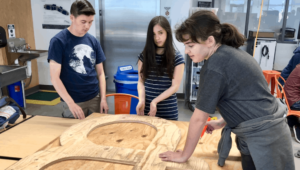Thinking Big with Chopra

DELHI. Aneesh Chopra, White House CTO, made a rock star entrance at the India-US Innovation Exchange Forum. Two competent Indian ministers also spoke at lunch but the Indian media was there to see Chopra. The Times of India ran headline story Obama’s CTA coming with tech team. Chopra is a terrific ambassador for the US and is attempting to connect governments and entrepreneurial ecosystems to solve big problems with State Department trips like this.
The US delegation—including a nonprofit executive, venture investors, a telecom executive, and a law professor—walked a Delhi settlement (slum) call Sanjay Gandhi Settlement and visited a couple schools. One government secondary school had foundation-funded smart boards and a few classes with new netbooks—well intentioned projects that illustrate the fact that EdTech is a decade behind other sectors.
At a lunch with Indian executives, we discussed topics of interest in both countries: teacher quality, workforce development, and blended learning strategies for delivering high quality low cost secondary education.
In and between meetings, we outlined a few big opportunities:
- *Student profile: like a patient record in health, we need a comprehensive student learning profile that captures learning levels, demographic data, motivational profile, and interests—a big enough list that it would need a Facebook-like privacy profile that families can manage. It’s still not clear where these profiles will sit—it’s far more extensive than SIS or LMS can or want to handle. It’s probably a social learning function with a permission system that would release data to several learning partners (i.e.,, school, tutoring center, guidance app)
*Meta-tagging: the Common Core creates a new opportunity for a common meta-tagging standard. In addition to a standard sub-skill, we should be tagging content type (e.g., print, video, game), length, themes/interests, learning mode. Eventually we’ll want to add efficacy or at least teacher ratings. It seems like a subset of the Digital Learning Council should be able to nail this in the next 90 days and it would enable a millions of objects to be tagged next year.
*Recommendation Engine: the combination of a smart profile and meta-tagged content makes it much easier to imagine the killer app—a smart recommendation engine that can build a personalized learning playlist.
*BlendedHiFi: USAID has a small program that offers loan guarantees to extend financing for clean tech in India. A similar program could extend the lending capacity of microfinance lenders like Indian School Finance Company that could make loans to school operators to adopt 1:1 student technology models (eg, iTouch, tablet or netbook) using a lot of open educational resources (OER). This would allow a private school operator to charge a little bit more in tuition. This wouldn’t work in the $4/month range (yet), but it might work in the $8/month range. A similar strategy of loan guarantees (by foundations) could be used to finance the adoption of blended high school models in the US with repayment made out of cost savings from a tiered staffing model.
A favorite quote of the morning was from Naren Bakshi, CEO of Jumpstart in Freemont CA, who said, “Nonprofits are a great place to experiment, but once you have a scalable concept, it deserves a business model and private investment.” I agree with Bakshi that private enterprise has an important role in producing and scaling innovation. But most of the big advances in learning will take public leadership, philanthropic support, and private investment. And it’s nice to have public leadership like Chopra working on the big problems.






0 Comments
Leave a Comment
Your email address will not be published. All fields are required.